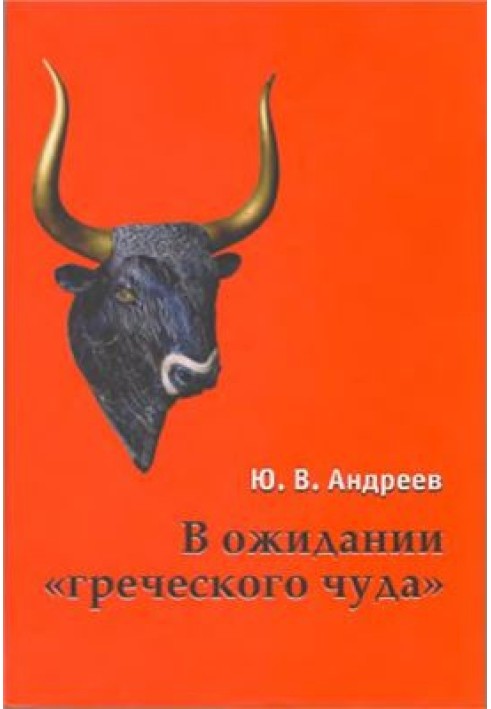Waiting for a Greek miracle. From notebooks
 Instant download
Instant download
after payment (24/7)
 Wide range of formats
Wide range of formats
(for all gadgets)
 Full book
Full book
(including for Apple and Android)
Proposed publication by the largest scholar of antiquity, Doctor of Historical Sciences, professor of history and archeology at Leningrad State University and IHMC RAS, Yu.V. Andreeva presents a collection of major articles written throughout the author’s scientific life and devoted mainly to key issues of the early history and culture of Ancient Greece, starting from the Bronze Age (III millennium BC) and until the beginning of the Archaic era, i.e. what was the foundation of the “Greek miracle” - the classical Greek polis, the first state of the European type. The second part of the book is the author’s reflections, entrusted to notebooks, about religion, Russian history and culture, about our writers and their perception of Russian and ancient history, and also his own literary experiments. It is illustrated with drawings by the author. CONTENTS: To the reader 5D. IN. Panchenko. Preface 7Part I. WAITING FOR THE “GREEK MIRACLE” Instead of introduction: The Aegean world: the natural environment and the rhythms of cultural genesis 11I. The Aegean World in the Bronze AgeTroy-Hissarlik among the Aegean cultures and civilizations of the Bronze Age 28Tower dwellings in the Cyclades? (On the interpretation of the so-called granary model from the island of Melos) 52 Man and deity in Cycladic art of the Early Bronze Age 59 The Aegean world on the eve of civilization 71 Palace and “city” on Crete in the 2nd millennium BC 92 Minoan Dedate 112 “Minoan matriarchy” ( Social roles of men and women in the social life of Minoan Crete) 132Motif of enthronement in the art of Minoan Crete 147Minoan tauromachy in the context of the Cretan cycle of myths 161Minoan death deities on a cylinder seal from Astracus 172 Eurasia and Europe (to the issue of the historical specificity of the Minoan civilization) 185Mina Talassocracy (current state of the problem) 211 in the expectation of the Greek Miracle (spiritual world of the Mycenaean society) 215k the problem of the Problem of the Minkensky Civilization 263 Greek on the threshold of the Iron Age 273III 263 . Homerovo Society and the myth in the legend of the Trojan War 280 Historism of the Homeric epic 311ranne Greek polis 321 political geography of the Homerian Greece (to the dating of the "Catalog of Ships" in Iliad) 336 muh alliances in the poems of Homer 352 Tsari and the tsarist power in Homer's poems 367k about the origin “demiurge” 378 To the problem of Homeric land ownership 387 Community in poems Homer 401Work in the life of Homeric heroes 411III. Sparta and CreteSparta as a type of polis 417Spartan “horses” 438Archaic Sparta: culture and politics 453Who invented the Greek phalanx? 471Greek polis without bureaucracy and literature (Writing in the life of Spartan society) 482Spartan gynecocracy 489To the question of the so-called “freedmen” in Crete 505To the question of the organization of the Cretan sissities 518Male unions in the structure of the Dorian polis 526IV. Greek polisEarly forms of urbanization 537Ancient polis and eastern city-states 555Initial stages of the formation of the Greek polis 572Historical specifics of Greek urbanization 584Tyrants and heroes. Historical stylization in the political practice of elder tyranny 604Greeks and barbarians in the Northern Black Sea region (Main methodological and theoretical aspects of the problem of interethnic contacts) 609V. Reviews Instead of a conclusion (Conversation between a critic and the author) 628 “Golden Autumn” of Ancient Hellas in the St. George Hall of the Winter Palace 638 The Gold of Troy - the second discovery 642 Epilogue: Apology of paganism, or the religiosity of the ancient Greeks 645 Part II. FROM NOTEBOOKSI. About religion “Human is too human” 661 Christianity and paganism [Excerpt] 661 From Homer to Christ (Sketches) 662 About “life after death” 666 Christianity and paganism 667 More about Christianity [Excerpts] 667 Reading S. N. Bulgakov (“Two Cities”. St. Petersburg, 1997) 669On the existence of God [Excerpts] 675Returning again to the question of Christianity 678II. About Russian history and cultureAbout the book Berdyaev “The Fate of Russia” 679 A retrospective look at Russian history 681 About our revolution 695 To the report “Spartan experiment” 69618/XI 1992. [About Krylov] 69619/XI 1992. “Klia’s terrible voice...” 697 About Tolstoy 699 Notes about Pushkin 700 About Mayakovsky 70 4About Chekhov 706"Russian Zoil". Ancient heritage in the assessments of P. Ya. Chaadaev 707Window into chaos. Reflections on the poem by A. S. Pushkin “The Bronze Horseman” 711 “Poor murderers,” or a bullet for Holy Rus' (Notes on A. Blok’s poem “The Twelve”) 715 About the “Scythians” 720 “The Roman Bolshevik” Catiline and the philosophy of history of A. Blok 725Mandelshtam and Spengler. Two views on Greek culture 736Russian man between Christ and Dionysus (Vyacheslav Ivanov as a researcher and interpreter of Greek religion) 740After reading the story Y. Nagibina “Darkness at the end of the tunnel” 74923/III 96. What are the distinctive features of the Soviet intelligentsia? 751III. By myself and about myself Notebook 1959-1960. 752Notebook 1960 755Records 1993-1995 761List of abbreviations 765List of illustrations 768AppendixWorks by Yu.V. Andreev, not included in this book, but related to its problems. Comp. J.I.B. Shadricheva 771
Data sheet
- Name of the Author
- Юрий Андреев Викторович
- Language
- Russian



















